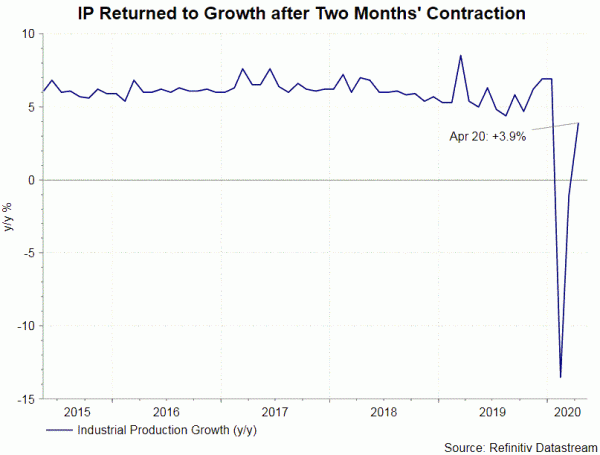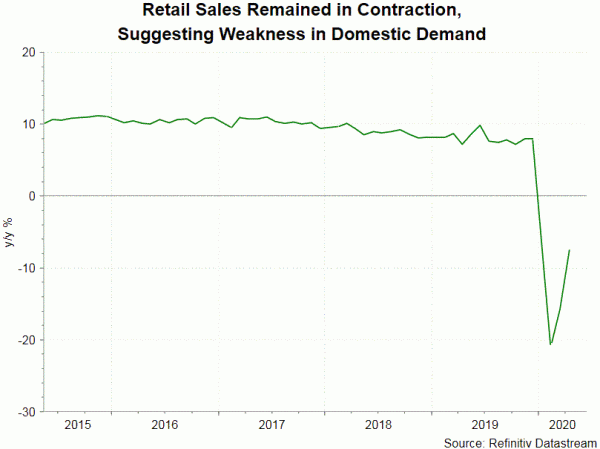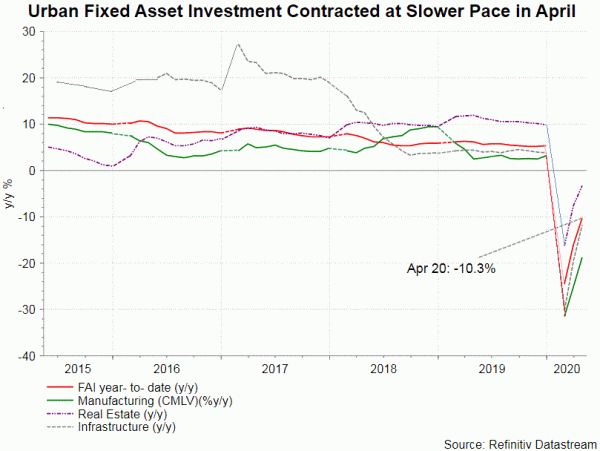Industrial production (IP) expanded +3.9% y/y in April, beating consensus of +1.5% growth and a -1.1% contraction in the prior month. The strong recovery was mainly driven by the low base effect. Production of automobile, and machinery and equipment contributed the most to the April recovery. These sectors were hurt severely in the first quarter due to the coronavirus outbreak. Strong productivity of industrial robots (+26.6% y/y) and integrated circuits (+29.2% y/y) was likely due to production for 5G infrastructure.
 Retail sales contracted -7.5%, following a -15.9% fall in March. The market had anticipated a milder drop of -7%. Catering spending plummeted -31.1% y/y in April, after diving -46.8% in the prior month. On a positive note, growth in online goods sales accelerated to +16.2%, from +10.7% y/y in March. Sales of telecommunications goods and cosmetics grew +2.2% and +3.5% respectively.
Retail sales contracted -7.5%, following a -15.9% fall in March. The market had anticipated a milder drop of -7%. Catering spending plummeted -31.1% y/y in April, after diving -46.8% in the prior month. On a positive note, growth in online goods sales accelerated to +16.2%, from +10.7% y/y in March. Sales of telecommunications goods and cosmetics grew +2.2% and +3.5% respectively.
Urban fixed asset investment (FAI) plunged -10.3% y/y in the first 4 months of the year, compared with -16.1% decline in the first quarter and consensus of -10%. The “stabilization” was ultimately driven by government investment which dropped -6.9% y/y year-to-date. Private investment, however, plunged -13.3% during the period.
The set of data indicates that, while the worst is over in China’s economy, the pace of recovery is very gradual and the process is thorny. While IP returned to growth, retail sales and FAI stayed in contraction. This suggests that recovery in the supply side is faster than the demand side. Stronger-than-expected IP growth might lead to pleasant surprise in GDP growth in 2Q20, given the positive correlation. Yet, we refrain from overtly optimistic over China’s recovery. Global economy is still struggling. For instance, unemployment rate in the US jumped to 14.7%, a level not seen since Great Depression, in April. Job markets in Eurozone and UK are worsening. Weakening global demand as a result of high unemployment will eventually lead to decline in China’s exports. This can be reflected in IP weakness in as soon as May.
Recent macroeconomic developments reinforce our view that the government will adopt a more accommodative stance of economic policies. Indeed, comments from officials have turned more dovish. Premier Li Keqiang, chairing the State Council regular meeting on May 13, indicated the intention to accelerate economic policies in response to the economic challenges. Separately, in an article published on the NDRC website, Director He Lifeng reiterated the importance of stabilizing the economy. We believe these are to pave the way for more stimuli (both monetary and fiscal) after the “two sessions” next week.


